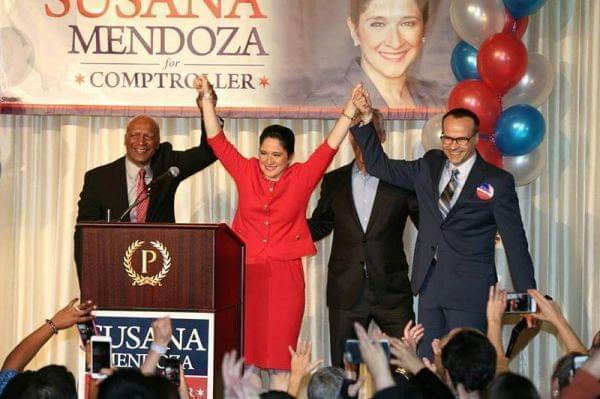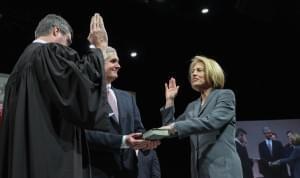Illinois Issues: Legislative Shifts Show Changing Regional Politics

Susana Mendoza celebrates her victory in the race for Illinois comptroller. Mendoza Campaign
Democrats prevailed in statewide races, but couldn't hold on to seats in southern Illinois. Meanwhile, suburban Republicans may hold less sway in the party's legislative caucus.
Commentary - Who won the Great Proxy War of 2016? In the immediate aftermath, both protagonists — Republican Gov. Bruce Rauner and Democratic House Speaker Michael Madigan — claimed bragging rights, citing selected results from last week’s general election to make their case.
The governor’s forces pointed to the GOP’s net gains of four seats in the Illinois House and two in the state Senate as proof that their long-time strategy of portraying Madigan as the Darth Vader of Illinois politics finally worked.
“This shows more than anything that people want a new direction, and they don’t want Mike Madigan running the state,” says state GOP Chairman Tim Schneider. “It validates the message we have been driving home for the last two years.”
Never mind that Madigan doesn’t really run the state… or isn’t the governor the chief executive?
Democrats in turn pointed to Chicago City Clerk Susana Mendoza’s win for Illinois comptroller over incumbent Leslie Munger, a self-described Rauner “wingman” who was hand-picked by the governor to succeed the late Judy Baar Topinka.
“We were outspent by millions of dollars by just three billionaires who think they can buy our political system,” Mendoza said during her victory speech. “They think they can buy our democracy. Well they’re wrong, and we sent a clear message today: The state of Illinois is not for sale.”
Of course Mendoza also had ample financial backing, courtesy of Madigan’s war chest.

Leslie Munger, who was appointed as comptroller by Gov. Bruce Rauner, lost her bid to retain the office.
In theory, the comptroller has no real role in setting policy; rather, the job description basically is writing checks to pay the state’s bills. But when money’s short, past office holders of both parties have nagged governors of both parties — and sometimes lawmakers — to do something about it. The comptroller has also had to practice financial triage, picking and choosing whom to pay and when to cut the checks.
For much of her time in office, especially as the bill backlog neared $10 billion heading toward Election Day, Munger urged state leaders to resolve the budget crisis. Her sharpest remarks were directed at the Democrats. Mendoza also will do the same, but expect Rauner to be the chief target. And while Rauner’s best interests figured into Munger’s triage, Mendoza will have no such concerns.
Illinois Democrats also touted their victories in a pair of high-profile congressional races. U.S. Rep. Tammy Duckworth ousted U.S. Sen. Mark Kirk, and former U.S. Rep. Brad Schneider reclaimed the North Shore district he lost two years ago to U.S. Rep. Bob Dold.
But the real Election Day focus for the statewide parties was not on the U.S. Capitol, but on the Statehouse, where all previous spending records were not just surpassed, but totally obliterated. Final numbers won’t be known until post-election finance reports are filed, but preliminary reports suggested a handful of relatively competitive legislative races soaked up some $60 million.
Most of the GOP money came from Rauner and a few of his mega-wealthy friends; Democratic coffers benefited from organized labor, trial lawyers and other long-time supporters. Almost all of it was spent on negative advertising — telling the folks back home why the other guy or gal was so terrible, and only occasionally mentioning, almost as an afterthought, why a voter should choose the candidate sending out the garbage.
In the final analysis, though, despite all the dollars and all the dirt, has anything really changed?
The obvious first response is that Madigan no longer has a supermajority. His ranks are down to 67 from 71, the minimum needed to override a gubernatorial veto. Although, despite losing two seats, Senate President John Cullerton still holds 37, more than the required three-fifths. The House shift ends a unique two-year stretch during which Democrats had the numbers to work their will against a Republican governor, the first time in state history either party has held that advantage.
In practice, though, the speaker’s veto-proof majority has proven illusory. Of 101 vetoes the governor has issued since taking office, only two have been overridden — one a measure to stretch out Chicago’s payments into its police and firefighters’ pension funds, the other a bill dealing with the heroin crisis, overridden with the governor’s blessings. Another 34 are still pending in the fall session. In most instances, though, a few Democrats balked, and overrides failed.
Whether Rauner and Madigan finally decide to call a truce for the sake of the state remains to be seen. Less uncertain are the dire consequences if the stalemate continues, especially to the state’s most vulnerable citizens relying on a shredding safety net and to the state’s community colleges and universities, key to meeting the needs of the 21st century workplace.
The election results also reflect a changed reality that would have been unthinkable just a generation ago.
Quick quiz: How many Republican legislators hail from districts rooted mostly in Cook County? Would you believe just four? Chicago Rep. Michael McAuliffe, who survived an all-out Madigan effort to unseat him in one of the costliest races in the nation, and three suburbanites —Sen. Tom Rooney of Rolling Meadows and Reps. David Harris of Arlington Heights and Tom Morrison of Palatine. The other 28 suburban Cook County seats are held by Democrats, as are 41 of 42 Chicago-based seats. Democrats also hold 18 of 43 seats in the so-called collar counties of DuPage, Kane, Lake, McHenry and Will.

Republican Dale Fowler beat Democratic Sen. Gary Forby from Benton. Forby was one of two long-serving southern Illinois lawmakers who lost their races this year.
Suburban Democrats were prime targets for Republicans, but none lost. The only GOP gain in the area was a northwest suburban seat vacated by Jack Franks, who chose to run — successfully — for McHenry County board chairman.
One might suspect, correctly, that having President-elect Donald Trump at the top of the ticket was no help to GOP suburban challengers, despite megabucks campaigns. But more significantly, demographic trends have been working against Republicans, as southern and western Cook County towns become home to more African-Americans, and growing numbers of Hispanic and Asian-Americans move into the collars.
Indeed, when the 100th General Assembly takes office in January, most Republican legislators will be from outside the Chicago metropolitan area —14 of 22 senators and 30 of 51 representatives. And more Democrats will be from the suburbs than from city-based districts, turning on its head the time-honored, now outdated, vision of solidly Democratic Chicago (still true), solidly Republican suburbs (no longer) and a fairly even mix of both parties Downstate (now strongly Republican, 14 to 6 in the Senate and 30 to 11 in the House.)
Compare the regional breakdown to two decades ago, when Republicans enjoyed a 31 to 28 edge in the Senate, including 19 from suburban districts, and were just shy of a House majority with 58, 34 of them from suburbia.
But the regional shift is more than academic testimony to the state’s changing ethnicity. The new dynamic may prove helpful in resolving the ongoing debate about revamping the way Illinois pays for its pre-K to 12 education system.
The general consensus is that the system is flawed, in that many schools don’t have the wherewithal to provide their children a good education, while other districts have facilities and programs rivaling the local community college. The cause is well-known. Illinois relies too much on local property taxes and too little on state dollars to cover the cost of elementary and secondary education. So students from school districts with major industrial facilities like a power plant, or a big shopping center, benefit from a sizeable tax base, in excess of $1 million per student in some areas. On the other hand, youngsters from low-income families and children of color, typically living in towns with little industry, less commercial development, and modestly-priced homes, have markedly fewer dollars available for their schooling.
The solution also seems fairly simple in principle — boost the state’s share of local school costs, now about a third, with much of the new funding going to poorer districts, the rest to reduce property taxes on a dollar-to-dollar basis across the state. In execution, though, it’s proven impossible, because increasing aid to poorer districts means reducing aid to richer ones.
Rauner, for example, has called for rewriting the school aid formula to help poor districts, but in such a way that no one loses. That’s possible only if the pie gets larger, and practically speaking the pie can get larger only if taxes are increased.
Almost 20 years ago, Gov. Jim Edgar proposed just such a deal. Hike individual and corporate income tax rates by 25 percent to bring in an additional $1.5 billion, then pump $600 million into property-poor districts and use the remaining $900 million to replace property taxes in districts across the state.
In 1997, though, suburbanites dominated the GOP caucuses in both chambers, and the Republican leaders, House Minority Leader Lee Daniels of Elmhurst and Senate President James “Pate” Philip of Wood Dale, were adamantly opposed, arguing that Edgar’s plan would funnel money from suburban taxpayers to Chicago and Downstate schools.
Despite Daniels’ objections, Edgar’s bill cleared the House, championed by, of all people, one Michael Madigan, the House speaker and Rauner’s favorite villain. Only seven of 58 Republicans voted for it, six downstaters who saw its benefits for their local schools and one suburban lawmaker who believed it was the right thing to do.
When the bill reached the Senate, though, Philip sent it to committee and never allowed a floor vote, which to this day Edgar believes would have carried. Perhaps Philip was not one of all-powerful Madigan’s puppets that day?
So the intriguing question becomes, if a similar tax swap proposal emerges next spring, providing significant assistance to their schools as well as Chicago, would some — many? — Republicans from downstate districts support it?
Wishful thinking, perhaps. But then how many folks expected a Trump presidency?
Illinois Issues is in-depth reporting and analysis that takes you beyond the headlines to provide a deeper understanding of our state. Illinois Issues is produced by NPR Illinois in Springfield.
Charles N. Wheeler III is director of the Public Affairs Reporting program at the University of Illinois Springfield.

